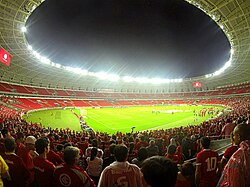Estádio Beira-Rio
Beira-Rio, Gigante da Beira Rio | |
 | |
 | |
| Full name | Estádio José Pinheiro Borda |
|---|---|
| Location | Av. Padre Cacique, 621-1571, Praia de Belas, Porto Alegre, RS, Brazil |
| Coordinates | 30°3′56.21″S 51°14′9.91″W / 30.0656139°S 51.2360861°W |
| Owner | Sport Club Internacional |
| Operator | SPE Holding Beira-Rio S/A |
| Capacity | 50,000[1] |
| Field size | 105 x 68 m |
| Surface | TifGrand |
| Construction | |
| Broke ground | September 12, 1956 |
| Opened | April 6, 1969 |
| Renovated | Autumn 2013 |
| Architect | Hype Studio |
| Tenants | |
| Sport Club Internacional | |
Estádio José Pinheiro Borda, better known as Estádio Beira-Rio (Portuguese pronunciation: [esˈtadʒiu ˈbejɾɐ ˈʁiu], Riverside Stadium) due to its location beside the Guaíba River, is a football stadium in Porto Alegre, Brazil. It serves as the home stadium for Sport Club Internacional, replacing their previous stadium, the Estádio dos Eucaliptos. It is named after José Pinheiro Borda, an elderly Portuguese engineer who supervised the building of the stadium but died before seeing its completion.
Estádio Beira-Rio was one of the 12 venues used for the 2014 FIFA World Cup, hosting five of the matches in the tournament.
General information
- Grass: TifGrand™.
- Box offices: 4, with 68 booths.
- Toilets: 81.
- Capacity 51,300 (5,000 VIP seats).
- Executive suites 125 (70 suites + 55 skyboxes).
- Video screens 2 (100m² each).
- Parking 5,500.
- Record Attendance 106,554 (Rio Grande do Sul All-Stars 3–3 Brazil national football team, on June 17, 1972).
History
In 1956, councilman Ephraim Pinheiro Cabral presented a document to the government that included a donation of part of the Guaíba, to be reclaimed for Sport Club Internacional.
Estádio Beira-Rio was constructed with the help of the club's enthusiasts and supporters. They contributed bringing bricks, concrete and iron.
During the 1960s, Estádio Beira-Rio was called "Bóia Cativa", since it seemed that it would never be completed, especially since those were difficult times for Internacional on the field.
The stadium's debut was played on April 6, 1969, when Internacional beat Portugal's Benfica 2–1. The first goal ever scored in the stadium was done by Internacional's Claudiomiro.
Current situation
Beira-Rio is the second biggest stadium in the Rio Grande do Sul state and also South Brazil. The stadium has recently been renovated to host the 2014 FIFA World Cup. The Beira-Rio complex also houses a chapel, an events center, bars, stores and a parking building for 3,000 cars. Parque Gigante, featuring pools, gyms, football fields, and tennis courts, is located next to it. The first test event after the stadium's renovation was hosted on February 15, 2014 in a match between Internacional and Caxias, a local club, for the Campeonato Gaúcho.
Improvement and restoration
The stadium has gone through restoration and developments that makes it fit to host matches during the 2014 FIFA World Cup in Brazil. Internacional has a project of restoration and improvement of Beira-Rio complex named 'Gigante Para Sempre' (Giant Forever). The stadium has been adapted to an international standard, ready to host any national or international game. Beira-Rio is one of the only 2014 FIFA World Cup stadiums to be privately owned.
Parking
For the convenience of the public who frequent games, concerts, stores, and restaurants at the complex, a parking building was constructed with a lower height than the trees. This has reduced the impact on the garden landscape. On the other side of the complex there is another parking lot beneath the promenade.
Additional pitches
The additional pitches, used for training of the senior and youth teams now has a new arrangement. New pitches and courts have been constructed.
Lower tier
Seats in the lower tier of the stadium were modified, the current seats were demolished and new seats were put in closer to the pitch. Construction is complete.
2014 FIFA World Cup
| Date | Time (UTC-03) | Team #1 | Res. | Team #2 | Round | Attendance |
|---|---|---|---|---|---|---|
| June 15, 2014 | 16:00 | 3–0 | Group E | 43,012 | ||
| June 18, 2014 | 13:00 | 2–3 | Group B | 42,877 | ||
| June 22, 2014 | 16:00 | 2–4 | Group H | 42,732 | ||
| June 25, 2014 | 13:00 | 2–3 | Group F | 43,285 | ||
| June 30, 2014 | 17:00 | 2–1 (a.e.t.) | Round of 16 | 43,063 |
Concerts
References
- ^ http://www.stadiumguide.com/beirario/.
{{cite web}}: Missing or empty|title=(help)
- Enciclopédia do Futebol Brasileiro, Volume 2 - Lance, Rio de Janeiro: Aretê Editorial S/A, 2001.
- Sport Club Internacional Official web site
